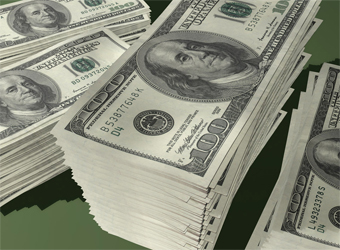Dollar rose against a basket of major peers on Wednesday as bargain hunters stepped in after it slid overnight to a seven-week low, reflecting mounting concerns.
The United States was poised to ditch a two decade-old strong dollar policy.
The dollar upped 0.4 percent at 113.260 yen after dropping overnight to a two-month low of 112.080.
The greenback had sunk the previous day as Trump and trade adviser Peter Navarro criticized Germany, Japan, and China, saying the trading partners were engaged in devaluing their currencies to U.S. disadvantage.
“Every other country lives on devaluation,” Trump said.
“You look at what China’s doing, you look at what Japan has done over the years. They play the money market, they play the devaluation market and we sit there like a bunch of dummies,” he added.
Despite Trump’s blunt statement, which increased the prospect of Washington reversing the strong dollar policy advocated by presidents dating back to the Clinton administration, the U.S. currency still attracted good demand.
“Trump is providing an opportunity for bargain hunters. The dollar ends up being sold on his statements, but ultimately it finds downside support as Treasury yields do not fall that much,” said Masashi Murata, senior currency strategist at Brown Brothers Harriman.
The benchmark 10-year Treasury yield made an about-turn after dropping the previous day and was about 2.5 basis points higher on Wednesday.
“There are suggestions that the correlation between the dollar and U.S. yields is decreasing. While this may be true to a degree, the correlation has not broken down,” Murata said.
The euro was 0.1 percent lower at $1.0791 following the previous day’s rise to a seven-week peak of $1.0812.
The common currency rose on Tuesday after Navarro told the Financial Times that Germany is using a grossly undervalued euro to gain advantage over the United States and its own European Union partners.
“Criticism of Germany by the Trump administration needs close attention. While a stronger euro might not hurt Germany that much, it could be detrimental to the Italian economy and potentially trigger a euro zone crisis,” said Makoto Noji, senior strategist at SMBC Nikko Securities.
Italy is faced with a banking crisis, its lenders saddled with a mountain of non-performing loans.
With Trump grabbing much of the headlines, the Federal Reserve’s policy decision due later in the day was relegated to a side event.
The Fed is expected to keep interest rates unchanged when it concludes its two-day meeting later on Wednesday, in its first policy decision since Trump took office, as the central bank awaits greater clarity on his economic policies.
The dollar index against a basket of major currencies was up 0.2 percent at 99.705 after falling nearly 1 percent overnight to its lowest level since Dec. 8.
Rattled by factors including Trump’s protectionist trade rhetoric and tough stance on migration, the dollar index lost 2.6 percent in January.
China’s offshore yuan was up 0.1 percent after rising about 0.4 percent the previous day.
The Australian dollar was down 0.25 percent at $0.7570, losing momentum after three days of gains.
The New Zealand dollar was 0.6 percent lower at $0.7275 after the jobless rate jumped and wage growth remained sluggish.
Source: Reuters


